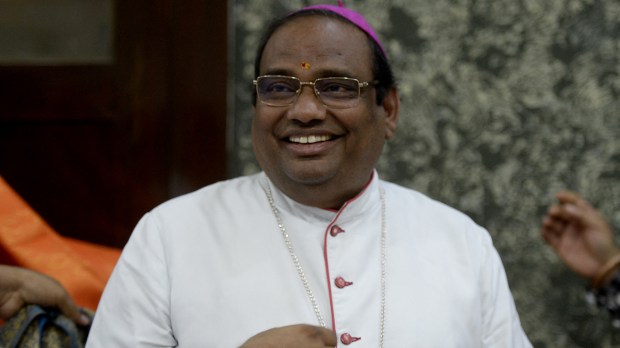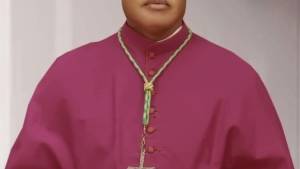Archbishop Anthony Poola, 60, is one of two Indians on the list of new cardinals to be created by Pope Francis in the upcoming consistory. His appointment has been hailed as the advent of the “first Dalit cardinal” in history. He’s also the first cardinal who speaks Telugu, a language spoken by more than 75 million people, especially in the Indian states of Andhra Pradesh and Telangana. He will represent one of the poorest regions of the subcontinent.
The archbishop is a native of Chindhukur, in the southeastern district of Kurnool, where he was born on November 15, 1961, into a family of the lower caste — the “untouchables” — to which two-thirds (65%) of India’s 18 million Catholics belong. Although discrimination on the basis of the caste system was abolished by the Constitution more than 70 years ago, the Dalits are still sometimes oppressed, and even persecuted, often relegated to menial work.
A simple, hard-working prelate
At noon on May 29—it was 4 p.m. in India at the time—Archbishop Poola had no idea that the head of the Catholic Church had just mentioned his name in St. Peter’s Square among the new cardinals. Friends from Sardinia who were watching television called him, but the cardinal-designate thought it was fake news. “And then I got another call from Sicily,” he tells Crux. “And then some priests in Rome called me. And after a while, the nuncio called me.”
The future cardinal told Crux that he doesn’t feel worthy of this office, but he sees in this choice the Pontiff’s solicitude towards “the peripheries, towards the poorest of the poor, […] for the region where I am at, as it is among the poorest in India, but also the one with the largest concentration of Catholics.” Catholics represent a small minority at 1.5% of the Indian population.
According to Fr. Joseph Arlagadda, Deputy Secretary of the Telugu Catholic Bishops’ Council, interviewed by The News Minute, Archbishop Poola owes this title to “his own dedication and commitment to the Church.” The prelate, he said, “has got very deep thoughts about the Church. He works hard and is a committed servant of the Church.”
He describes himself as “a simple priest, a simple missionary.” Speaking to Crux, Jesuit priest Fr. A. X. J. Bosco described Poola as a “cultured gentleman, very kind to everyone. […] open and generous,” and showing “a special love for the poor.”
Education of the young
After his studies at the seminary in Bangalore, Anthony Poola was ordained a priest on February 20, 1992, for the diocese of Cuddapah. He owes his vocation to the generosity of missionaries who financed his studies when he was too poor to pay for his own formation. “But they took charge of me and helped me go to school and made me [feel] worthwhile. That is the reason why I want[ed] to join the seminary,” he told Vatican News in an interview.
Between 1992 and 2001, the young priest served as a curate and then as a pastor for various parishes. From 2001 to 2003, he completed a Master’s degree in pastoral healthcare at Loyola University in Chicago, USA. Upon his return to India, he served for four years as director of the Christian Foundation for Children and Aging.
On February 8, 2008, he was appointed Bishop of Kurnool, where he remained for 12 years. At the same time, Bishop Poola served 12 years as president of the Andhra Pradesh Social Service Society, and as general secretary of the Telugu Catholic Bishops’ Council from 2014 to 2020. On November 19, 2020, Pope Francis appointed him Archbishop of Hyderabad in the neighboring state of Telangana.
Archbishop Poola is also very involved in the field of education in the poorest villages. He has served as chairman of the Youth Commission of the Andhra Pradesh Bishops’ Conference and as deputy director of Catholic schools in the diocese. And he started a reform in his diocese to “empower women and children.”
Seeing the devotion and enthusiasm of the very poor in remote villages inspired him with “compassion and love, and especially a great responsibility I felt to the children to give them a gift of education because they don’t have money or assets to sell. But if you give education for them, that will be a great gift,” he told Vatican News. The future cardinal, who has often taken it upon himself to bring poor children to school, vows “to help as many poor children as possible.”
The Church needed a Dalit cardinal
By choosing an “untouchable,” Pope Francis is once again making a gesture towards the most marginalized peripheries. According to the Indian press, various Dalit groups saw the appointment as an honor for the underprivileged fringes of society. “I think, maybe this is a situation where the pope is expecting me to solve the problems of the poor, the marginalized, and maybe also Dalits,” Archbishop Poola told Vatican News.
Fr. Devasagaya Raj, former national secretary of the Commission for Scheduled Castes at the Indian bishops’ conference, says “the history of the Indian Catholic Church is taking a new turn.”
“Once,” he told Crux, “a well-known theologian, Father Felix Wilfred, wrote in an article that the Dalits don’t need a cardinal but the Church needs a Dalit cardinal. This need is fulfilled now.”
This promotion to the rank of Prince of the Church is all the more celebrated because in recent months Dalit activists have asked the Vatican to increase Dalit representation in the Church hierarchy. In the state of Tamil Nadu, they lamented that only one out of 18 dioceses has a Dalit prelate. Of India’s 215 bishops, only 11 are Dalit and only two of the country’s 31 archbishops are “untouchables.” The Dalit movements are also asking Rome for a liturgical rite representative of their culture.
Poola, along with the other Indian to be created a cardinal on August 27, Archbishop Filipe Neri António Sebastião do Rosário Ferrão of the former Portuguese colony of Goa in the east of the country, will join three other Indian cardinals under the age of 80—Baselios Cleemis Thottunkal, George Alencherry, and Oswald Gracias—bringing the number of Indian electors in the College of Cardinals to five.


